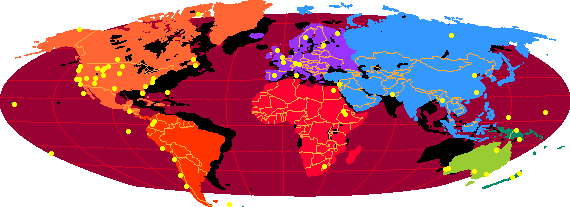


UCMP research is global, extending to all continents including Antarctica (not pictured). Each dot indicates a site where significant collections have been made, field work is being done, or independent and/or collaborative research is in progress. Some of the more significant research/collections include:
- North America
- California
- – Pleistocene vertebrates collection from the Rancho La Brea "tar" pits in Los Angeles and other California sites;
- – Miocene vertebrates from the Blackhawk Ranch Quarry near Danville;
- – A significant collection of microfossils from trailblazing research on Cenozoic biostratigraphy of California.
- ALSO evolution of rocky shore animals (SE Farallon Island, San Nicolas Island); bone mechanics (Stanford); molecular phylogeny of foraminifera (Catalina Island, Tomales and San Francisco Bays); Miocene marine vertebrates (Sharktooth Hill); Tertiary terrestrial vertebrates (San Diego, Mojave and Cuyama Valleys).
- Alaska
- – Investigation of Late Cretaceous vertebrate faunas from the North Slope.
- Pacific Northwest
- – Systematics, paleoecology, and evolution of Tertiary deep-water mollusks (Washington and western Oregon).
- ALSO evolution of rocky shore animals (Tatoosh Island and Juan de Fuca Straits, WA); larval development of primitive marine gastropods (Friday Harbor Marine Laboratory, WA); test strength of Recent benthic foraminifera (WA); Neogene lower vertebrates (WA); collections of Cenozoic vertebrates (OR).
- Arizona
- – Collections of fossil vertebrates from the Triassic and Jurassic.
- ALSO earliest North American turtle.
RETURN TO TOP
- Utah
- – Collections of Cretaceous to early Tertiary vertebrates and plants from southern Utah.
- ALSO late Eocene vertebrates.
- Wyoming
- – Evolution of early Eocene vertebrate faunas of the Bighorn Basin and their relationship to climate change.
- ALSO Bighorn Basin turtle faunas; middle Eocene turtles (southern WY); excavation of sauropods (Greybull).
- Montana
- – Over 20 years of research into patterns of evolution of terrestrial biotas across the Cretaceous-Tertiary boundary (north central MT).
- ALSO paleohistology (Bozeman); Cretaceous floral change; Late Jurassic and Cretaceous vertebrates and plants (Bridger, Shawmut).
South America
– Research on living tree ferns and Carboniferous and Cretaceous flora in Colombia;
– Origins of the Galapagos Islands and their biota.
ALSO evolution of rocky shore animals (Chile); evolution of Cretaceous flora (Colombia); Carboniferous compression megafloras and palynofloras (Peru).
Antarctica
– Research on the origin and evolution of the modern Antarctic marine biota.
Africa
– New discoveries of Mesozoic vertebrate fossils in Ethiopia;
– Outstanding collections of Permian and Triassic vertebrates from South Africa;
ALSO late Eocene to early Oligocene mammal phylogeny and biogeography (Egypt).
Europe
– Joint research and field programs with the Paleontological Institute of the Russian Academy of Sciences in Moscow;
– New discoveries of the earliest metazoans (White Sea; Lena River, Siberia).
ALSO evolution of rocky shore animals (Austria, England, Scotland); pterosaur studies (Germany); paleohistology (France); earliest fossil record of skeletonized protists (northwest Russia, Sardinia, Spain, Sweden).
RETURN TO TOP
Australia
– Important collections of Tertiary vertebrate faunas (South Australia, Northern Territory);
– Studies of the ecology and paleoecology of Cenozoic vertebrates and gastropods.
ALSO evolution of rocky shore animals (Perth, Rottnest Island, Sydney); interpretation of operculum concentrations (Rottnest Island).
Asia
Early vertebrate evolution, late Eocene faunas (Myanmar); late Eocene faunas (China); earliest fossil record of skeletonized protists (Hunan Province, China); Paleogene marine turtle (Pakistan); Eocene whale vertebra description (Negev Desert, Israel).
|

